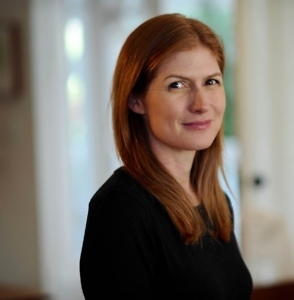Keep Calm and Parent On
In Maile Meloy’s Do Not Become Alarmed, a family holiday veers into disaster
Cousins Liv and Nora—as close as sisters—have decided to spend Christmas differently this year, booking their families on a joint holiday. Ostensibly, the cruise will be a glamorous adventure—the towering ship, “like an enormous white layer cake,” will set out from San Pedro, head down to Central America, and make its northward turnaround at the Panama Canal. But even before the children, ages six to eleven, go missing during an off-ship beach swim, Liv and Nora seem primed for disaster.
 This novel makes a voyage into dark waters: the ceaseless uneasiness so frequently found in modern American family life. In their marriages—to Benjamin, an engineer, and Raymond, a film actor—and in their everyday choices as mothers, Liv and Nora seem to be feeling out every situation for both small surface tremors and giant subterranean tectonic shifts. When the fateful moment comes, the children’s disappearance seems like a natural extension of the mothers’ perpetual vigilance and concern.
This novel makes a voyage into dark waters: the ceaseless uneasiness so frequently found in modern American family life. In their marriages—to Benjamin, an engineer, and Raymond, a film actor—and in their everyday choices as mothers, Liv and Nora seem to be feeling out every situation for both small surface tremors and giant subterranean tectonic shifts. When the fateful moment comes, the children’s disappearance seems like a natural extension of the mothers’ perpetual vigilance and concern.
We understand right away that Liv and Nora are heading up privileged L.A. families, doing their best and fearing that it isn’t enough. Asked by a police officer about her profession, Nora punishes herself: “She had always hated that question. Her job was taking care of her family. And now the one time she slipped, she had been punished like Job. God had sent a lightning bolt to destroy everything she cared about.”
The children themselves are natural problem-solvers, and from the start their inclination is to look out for one another. Penny, an opinionated, observant girl, knows to keep watch over diabetic Sebastian: separated not only from his parents but also from his insulin pump, the stakes are even higher for him. Marcus has presented some developmental signs of concern, at least on the L.A. private-school scale of assessment, and his tiny sister June looks like the definition of vulnerable. Stranded together with two older children from an Argentinian family also on their cruise ship, the children veer into unexpected territory.
 Meloy wisely contrasts the vacationing Americans with the concerns of local characters. From the deck of the ship, the Americans rather casually pass on excursions where “beheadings” might be on the itinerary. Observing their guide, Pedro, stripping his shirt off to swim in the ocean, Liv takes stock of the smallpox vaccination and abdominal marks, thinking, “Those were not first-world scars.” In other chapters, we follow a young girl named Noemi, smuggling herself north to America, to Nueva York, where she can reunite with her parents after years of separation.
Meloy wisely contrasts the vacationing Americans with the concerns of local characters. From the deck of the ship, the Americans rather casually pass on excursions where “beheadings” might be on the itinerary. Observing their guide, Pedro, stripping his shirt off to swim in the ocean, Liv takes stock of the smallpox vaccination and abdominal marks, thinking, “Those were not first-world scars.” In other chapters, we follow a young girl named Noemi, smuggling herself north to America, to Nueva York, where she can reunite with her parents after years of separation.
The side-by-side exploration of what trouble looks like for this wide range of nationalities—again, the everyday problems alongside the catastrophes—gives the novel a richer emotional resonance, even in moments when the tone is wry or relatively light. These characters’ dilemmas never become maudlin; instead, Meloy draws us closely inside their particular frames of reference. She grants us access to most of the main characters’ points of view, each one equally well-developed. The moments at which the narrative switches from one character’s experience to another display, time and again, the author’s precision and control over this material and its large cast of characters.
Meloy has crafted a masterful adventure which tumbles forward with such rapid, suspenseful momentum that the novel becomes truly difficult to put down. In lesser hands, the pace and structure of Do Not Become Alarmed might have become unwieldy. Instead, we barrel along, caught up in the story’s every bend and twist.

Emily Choate holds an M.F.A. from Sarah Lawrence College. Her fiction has been published in Shenandoah, The Florida Review, Tupelo Quarterly, and The Double Dealer, and her nonfiction has appeared in Yemassee, Late Night Library, and elsewhere. She lives in Nashville, where she’s working on a novel.


